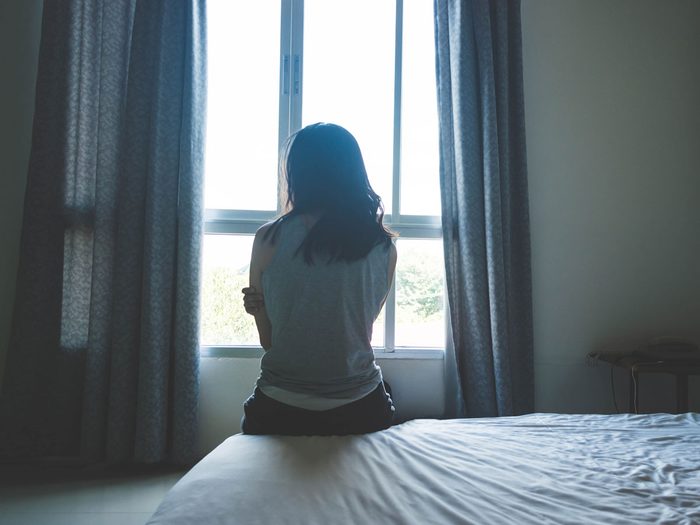
Take care of yourself
Sometimes the small things add up—skip exercise, eat poorly, stay up late, and suddenly you’re feeling lousy. These things alone may not necessarily lead to a diagnosis of depression, but they may keep you from feeling your best.
If you’re already at risk for this energy-sapping, mind-numbing disorder, you’re better off avoiding the following habits that can wreck your mood.

Eating processed foods
A quick hot dog or bag of chips may be a tasty snack every once in a while, but too many highly processed foods might leave you feeling blue. A 2013 analysis of research on diet and depression published in The American Journal of Clinical Nutrition found that the healthier their diet, the lower their depression risk. Earlier research suggests that people who eat the most processed foods have a higher depression risk. Keep in mind that these types of studies just show an association between a poor diet and lower mood, they can’t prove that one actually causes the other. However, eating a healthy diet—which was defined in the first study as a high intake of fruit, vegetables, fish, and whole grains—isn’t a bad idea for many reasons.
It can be difficult to avoid all processed foods, especially in a time pinch, but these simple tricks can help train your brain to stop relying on junk food.

Spending too much time alone
Spending some quality time alone every now and then can be hugely beneficial to your mental health, says Susan Heitler, PhD, a clinical psychologist and author of Prescriptions Without Pills. However, warns Heitler, spending too much time in solitude can reverse these effects and actually increase your depression risk. To protect yourself against this, she emphasizes the importance of creating strong friendships and relationships with others.”We can give or receive smiles and laughter,” she says. “Any time we connect with someone else, it’s an opportunity for positive emotional exchange. (Here’s how to beat loneliness and enrich your life.)

Multitasking your media
With smartphones, laptops, televisions, and streaming services all begging for our attention 24/7, it’s becoming increasingly common for people to consume media from more than one device at a time. In fact, experts estimate that the average amount of time spent multitasking your media has doubled. While it’s become a habit for many people to scroll through their phones while watching Netflix, research shows that this overload of media may be bad for your brain. A 2013 survey of 318 people published in Cyberpsychology, Behavior, and Social Networking revealed that people who reported multitasking their media more often experienced more symptoms of depression and social anxiety. To combat this, try spending time with only one screen at a time, and limiting your screen time altogether. (Psst: See why social media could be destroying your chance of happiness.)

Spending time with negative people
Critical, negative comments from your friends, boss, or significant other can do more than put you in a temporary funk. Rather, surrounding yourself with such negativity can actually boost your risk of feeling depressed. “No one likes to be talked to in a snippy or harsh voice,” Heitler says. “Being around someone who’s sending that negative energy is problematic. It will make you feel down.” Instead, form relationships with people who positively reinforce your actions, rather than constantly nit-picking at your decisions. Doing so can help you view life through a more positive lens, decreasing your likelihood of developing depression. (Here’s how to move on from a toxic friendship.)

Not getting enough green time
City living can carry a bunch of perks—delicious food, convenient public transportation, exciting nightlife—but spending too much time in urban areas can put a damper on your mood. According to a 2011 study by the Central Institute of Mental Health at the University of Heidelberg, living in a big city is linked to higher levels of stress and mental illness, especially depression. For city dwellers trying to avoid these effects, try taking quick trips to parks or rural areas to surround yourself with nature and take a break from the city hype. If getting out of the city every once and a while isn’t feasible, Dr. Heitler suggests keeping a few potted plants in your living space to lighten the mood. “There is a kind of positive energy that plants and natural things do give off,” she says.

Going to bed late
You’ve probably heard the old adage that “early to bed and early to rise” makes you “healthy, wealthy, and wise.” Well, as it turns out, there’s actually some truth to the trope. A 2014 study published in the journal Cognitive Therapy and Research found that people who went to bed later reported more chronic negative thoughts throughout the day—behaviour that has been linked to depression. Conversely, those who fell asleep earlier experienced fewer bouts of negative thinking. (Check out what to do if you have trouble falling asleep.)

Living a sedentary lifestyle
Too much time spent glued to the TV or other electronic devices could have an impact on your mental health. As Dr. Heitler explains, exerting physical and mental effort with things like exercise or important projects lifts your mood and lowers your chances of feeling depressed. When you’re physically active, your brain releases feel-good chemicals—like endorphins and endocannabinoids—that can alleviate feelings of depression. Exerting mental effort, on the other hand, lightens your mood in a slightly different way. “People need a project that gives them a purpose in order to feel good,” Dr. Heitler says. “Having nothing that you feel really invested in makes you vulnerable to depression.” Plan a project, pursue a passion, or volunteer your time to help others; these activities give you something to work for and get excited about.
Next, check out these tips for helping a friend or family member who’s struggling with depression.
